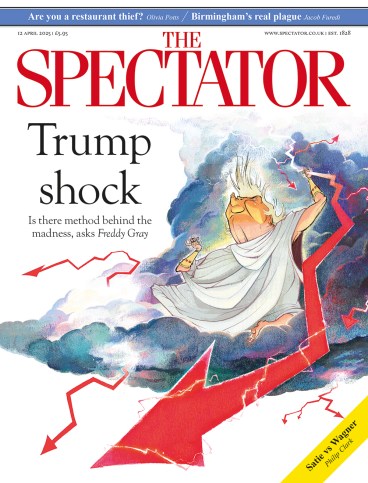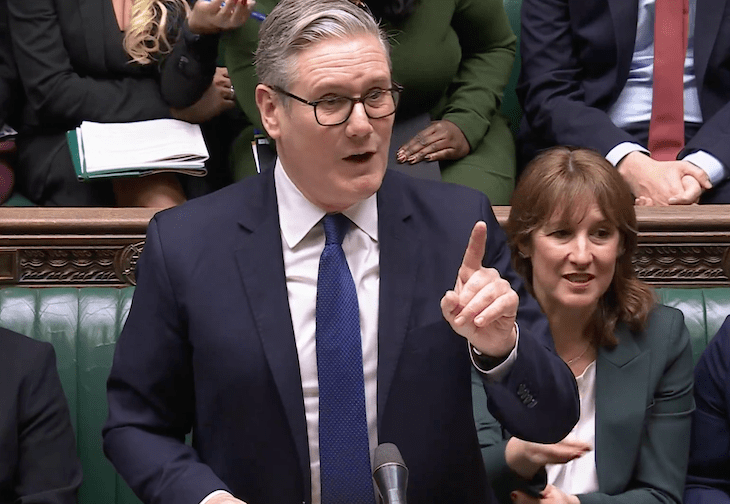
In 2011, the Hampstead theatre put on an autobiographical play about a marriage strained by lies, betrayal and, as the exasperated wife says, the presence of ‘three of us’ in the relationship. The play was Loyalty by the journalist Sarah Helm, the third person was Tony Blair and the principal male character was a barely disguised Jonathan Powell, her husband and Blair’s chief of staff. The lies are about Iraq’s weapons of mass destruction, and the betrayal occurs when the Powell character goes along with the war despite not ‘really’ believing in it, siding with Blair over his partner.
Two decades on, Powell is Keir Starmer’s national security adviser and may have more influence over foreign policy than anyone in government after the Prime Minister himself. He is one of the few senior officials responsible for the Iraq war who has managed a return to the corridors – and the sofas – of power. The historical record shows that he had doubts about Iraq’s WMDs, but thought Saddam Hussein had to go ‘because he was a ruthless dictator suppressing his people’. This was, as Blair named it, ‘liberal interventionism’, which called for the West to ‘get actively involved in other people’s conflicts’. Though Powell is more ‘grizzled’, as one old colleague puts it, he has the same instincts today. After Iraq, and Afghanistan, he still wants to save the world.
Powell came to Blair’s Downing Street through a series of chance encounters. He started off working at the BBC and Granada TV, but – by his own account – his parents thought journalism wasn’t a proper job and he applied to join the Foreign Office (it had a better pension). He became a political officer at the Washington embassy and chose to follow an outsider in the Democratic primaries, Bill Clinton, because they had been to the same Oxford college. When Blair visited the US in opposition, Powell was able to introduce him to Clinton. One of his contemporaries remembers: ‘Jonathan really fell in love with Tony.’ When Blair’s first choice to be his chief of staff turned him down, he asked Powell.
Sir Sherard Cowper-Coles was chief of staff to the foreign secretary, Robin Cook, and spoke to Powell at No. 10 ‘almost every day’. He tells me Powell is ‘pragmatic, sensible… tough, fair minded, good with ministers – a real operator’. He also has a ‘sense of the absurd’ – no doubt a requirement for working in Whitehall – and ‘can be quite sardonic’ in private. Sir Sherard calls him ‘an inspired appointment’, especially given the current geopolitics, because he knows America. ‘Despite Iraq, he’s a very, very good man. We’re lucky to have him. He’s a national asset, and far better than having some jobsworth Foreign Office official.’
Sir Sherard wrote an introduction to Helm’s play, calling the invasion ‘morally wrong, politically mad, and almost certainly illegal’. Many officials agreed ‘deep down’ but only two ‘had the guts’ to resign. Some 179 British servicemen and women were killed, along with more than 4,000 Americans and some 200,000 Iraqi civilians, but Powell has never repudiated the war. Instead, he has spoken, lightly, of being a ‘redeeming sinner’. There has been no British equivalent of Robert McNamara, the US defence secretary during Vietnam, who spent his last years publicly regretting having been ‘wrong, terribly wrong’. One former senior official who served alongside Powell told me he was now sometimes critical of Blair in private but would always be loyal in public. Powell knew that to do otherwise would mean ‘effectively saying to people that their kids died in vain’.
Powell’s great achievement at Blair’s No. 10 was bringing peace to Northern Ireland. He conducted a secret negotiation with the IRA to get them to sign what became the Good Friday Agreement. An RUC officer at the time told me that to keep the talks going, Powell even tipped off the IRA that one of their arms shipments from eastern Europe was being watched. This supposedly allowed the IRA to walk away without losing money or personnel. I’m told Powell has no recollection of anything like this and didn’t get operational intelligence as Downing Street chief of staff. Powell’s allies say there were many such ‘rumours floating around the system’. And anyway, they argue, this would have been a small price to pay for peace.
He has never repudiated the Iraq war. Instead, he has spoken, lightly, of being a ‘redeeming sinner’
Some accuse Powell of romanticising the Republican gunmen. A former intelligence officer said he’d spoken to Powell many times about his clandestine talks and thought he was ‘too impressed by the other side… There’s definitely a slight element, and I don’t want to exaggerate this, of the sexiness of dealing with killers’. Ulster’s ‘securocrats’ were horrified to get reports of Powell jumping into a taxi at Belfast airport with a notorious IRA bomber.
Powell has written that Blair authorised him to go alone to meet the Republicans on their own turf to build trust. Powell’s father, an air vice-marshal, had been shot at by the IRA; his brother, Charles – Margaret Thatcher’s most trusted adviser – had been forced to hide under the cabinet table during an IRA mortar attack. When Powell met the Sinn Fein leaders, Gerry Adams and Martin McGuinness, for the first time, he refused to shake their hands. He would eventually call that ‘a petty gesture I now regret’.
Powell later wrote a book called Talking to Terrorists and this is exactly what he did after leaving office along with Blair. He founded a charity, Intermediate, that worked secret back channels to try to bring an end to conflicts around the globe. In 2015, he proposed talks with Isis. This was not long after Jihadi John had severed the heads of British and American hostages on video. Powell wrote in the Atlantic that ‘once the red mist of rage’ had lifted it was important ‘to think coolly and calmly’ about a long-term strategy for ending the violence. He thought you could split the ‘more moderate’ Isis leaders from those trying to usher in the apocalypse. One source told me Powell had gone on to meet Isis, though he has never confirmed this. He did, apparently, meet Mohamed al Jolani, once al-Qaeda’s leader in Syria, now the country’s President. This is proof, Powell would say, that you should talk to anyone.
Powell’s years of negotiating are a guide to what he will do now as national security adviser. Just after last year’s general election, he said conflict resolution should be a priority for the new Labour government: ‘We can make it our sort-of USP.’ He told a conference at Chatham House that the ‘one opportunity’ provided by Brexit was to make it easier to bring armed groups to Britain for talks. Even when he was at No. 10, he said, he had never been able to get visas for the Hamas leadership, because of EU and other rules. Mediation could largely be done by NGOs or individuals, ‘government steering, not rowing’. Britain could help bring peace to the Sahel, Ethiopia, Sudan, Myanmar and many other places. ‘I find myself apologising for my ancestors everywhere from Myanmar to the Middle East to Nigeria. So, I think we always have a duty to do something.’
This is the new version of liberal interventionism: make the world a better place, but not at the point of a gun. The new two-word doctrine for British foreign policy is ‘progressive realism’, a term coined by the Foreign Secretary David Lammy: idealism plus realpolitik. Britain will now operate in the world as it is, not the world as we would like it to be. The Labour government will hold fast to our values, while also working in the national interest. It will be a good trick if Powell can pull it off: cakeism in foreign policy.
Powell’s first test was to finalise a deal for the Chagos Islands. The aim was to expunge Britain’s colonial guilt for having kicked the Chagos islanders out in the 1960s, sending many to live near Gatwick airport. The solution is not to give the islands back to them, but to give the territory to Mauritius, along with £9 billion. This is also the deal that will, apparently, satisfy the lawyers. The US had a veto, because of their runway and listening post at Diego Garcia. The deal, it seems, has squeaked past Donald Trump.
He said the ‘one opportunity’ provided by Brexit was to make it easier to bring armed groups to Britain for talks
Keeping President Trump happy was a major reason Powell got the Ukrainians to agree to a ceasefire – his triumph in his new role at No. 10. He did it almost alone, taking a very small team with him to Kyiv and scripting the Ukrainian reply to the US, according to one source. Britain will send peacekeepers in the unlikely event that this leads to a deal with Russia to end hostilities. It is an echo of Iraq: a British government sending troops into danger to maintain the transatlantic alliance. (In 2001, it was Powell who told the British ambassador in Washington to ‘get up the arse of the White House and stay there’.) Tom Fletcher, a former No. 10 official now with the UN, told me that Powell was perfectly suited to the current ‘transactional’ reality in world affairs: ‘You need somebody who knows how to get deals done.’
Others are not so sure. The former intelligence officer critical of Powell’s attitude to the IRA tells a story about Field Marshal Lord Inge being invited to No. 10 to be asked about invading Iraq. Inge told the Blairites ‘You only go to war as a very last resort’, a message they did not want to hear. Inge remained silent about the meeting for many years but eventually the old soldier spoke about his dismay that – in his words – ‘they were all randy for a war’. No one at No. 10 now seems to have the same eagerness, but the former spy said Powell shared with Starmer ‘an unshakable conviction in his own moral superiority’ that was dangerous in its own way.
Powell wrote a memoir about his time in Blair’s No. 10, a guide to wielding power called The New Machiavelli. He described himself back then as more ‘Candide’ than calculating, ‘unable to stop asking gauche questions and blurting out the truth, however inconvenient’. That was always disingenuous, and no one now would accuse Powell of being naive. The question with Powell back at No. 10, and as influential as ever, is how much his idealism will be tempered by realpolitik, how much Candide will be restrained by Machiavelli.








Comments